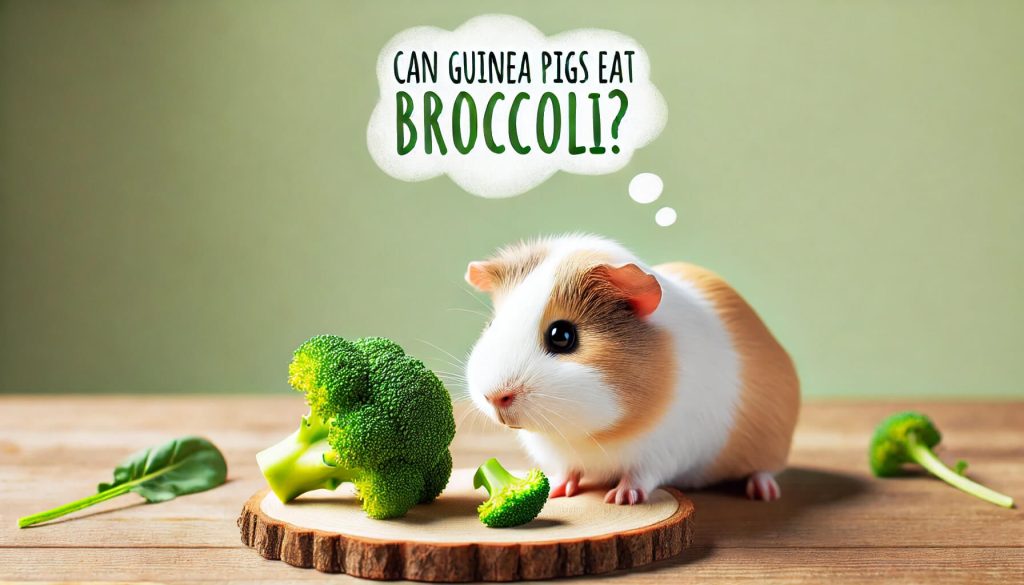
Can Guinea Pigs Eat Broccoli?
Understanding Guinea Pig Diets
Guinea pigs require a balanced diet to maintain their health. Providing the right mix of nutrients ensures they stay active and thrive.
What Do Guinea Pigs Normally Eat?
Guinea pigs primarily consume hay, fresh vegetables, and guinea pig pellets. They need hay for fiber, which aids digestion and prevents dental issues. Fresh vegetables, such as bell peppers and leafy greens, supply essential vitamins. Guinea pig pellets complement their diet with necessary nutrients, particularly vitamin C. Provide unlimited hay, fresh vegetables daily, and a consistent supply of pellets.
The Importance of Vegetables in a Guinea Pig’s Diet
Vegetables play a critical role in a guinea pig’s diet. They offer vital nutrients that pellets alone can’t provide. Vitamin C, found in many vegetables, is crucial since guinea pigs can’t synthesize it. Include a variety of vegetables like bell peppers, kale, and carrots, but limit high-sugar options. Rotate different vegetables to ensure a balanced intake of essential nutrients and to prevent dietary boredom.
Can Guinea Pigs Eat Broccoli?
Yes, guinea pigs can eat broccoli, but it’s important to understand both the benefits and potential risks.
Nutritional Benefits of Broccoli for Guinea Pigs
Broccoli offers several nutritional benefits to guinea pigs. It’s a rich source of vitamin C, which is crucial for guinea pigs as they can’t produce this vitamin on their own. Each 100g of broccoli provides approximately 89.2mg of vitamin C, surpassing their daily requirement. Broccoli also contains fibers that aid in digestion and support a healthy intestinal system. It provides antioxidants that help reduce inflammation and help maintain overall health.
Potential Risks of Feeding Broccoli to Guinea Pigs
Despite its benefits, broccoli also has potential risks if not fed properly. It contains high levels of calcium, which may lead to bladder stones in guinea pigs if consumed in excess. Broccoli also produces gases, which can cause bloating and discomfort in guinea pigs. Limit broccoli intake to a few small florets per week and monitor your pet for any signs of gastrointestinal distress. If you notice any issues, reduce or eliminate broccoli from their diet.
How to Safely Introduce Broccoli to Your Guinea Pig’s Diet
Introducing broccoli to your guinea pig involves several careful steps to ensure their health and well-being.
Preparing Broccoli for Guinea Pigs
Wash the broccoli thoroughly under running water to remove any pesticides or contaminants. Cut the broccoli into small, manageable pieces, focusing on florets and stems, avoiding leaves which can be tough. Ensure that pieces are small and easy for your guinea pig to chew and digest.
Recommended Serving Size and Frequency
Offer a small amount of broccoli initially, about one floret or a few small stem pieces. Monitor your guinea pig for any signs of digestive distress, like bloating or gas. If they tolerate it well, you can continue to offer broccoli 1-2 times per week. Remember to balance their diet with other vegetables for optimal nutrition.
Alternative Vegetables Suitable for Guinea Pigs
Variety ensures guinea pigs receive a broad range of nutrients. Offering different vegetables also prevents dietary monotony.
- Bell Peppers: Rich in vitamin C, bell peppers support guinea pigs’ immune system. Unlike broccoli, they contain lower calcium, reducing the risk of bladder stones.
- Carrots: High in beta carotene, carrots promote good vision and overall health. Feed in moderation due to natural sugars to avoid weight gain.
- Cucumbers: Low in calories and hydrating, cucumbers make a refreshing treat. They also aid digestion without adding excess calories.
- Zucchini: Offering vitamins A and C, zucchini helps boost immunity and maintain healthy skin. It’s also lower in oxalates, which can prevent urinary issues.
- Romaine Lettuce: A great source of fiber, romaine lettuce keeps the digestive system running smoothly. It’s preferable over iceberg lettuce due to higher nutrient content.
- Kale: Packed with vitamins K and C, kale supports bone health and immune function. Offer in limited amounts to avoid high calcium intake.
- Spinach: Provides essential nutrients like iron and calcium. Serve sparingly to prevent high oxalate content from causing kidney stones.
- Tomatoes: Contain vitamins A and C, enhancing overall health. Remove seeds and stems before feeding as they can be harmful.
Maintaining a varied vegetable diet ensures guinea pigs get necessary vitamins and minerals. Always wash vegetables thoroughly to remove pesticides. Rotate vegetables weekly to keep meals interesting and nutritious. Monitor your guinea pigs’ health and adjust their diet as needed for optimal well-being.
Conclusion
Feeding broccoli to your guinea pigs can be a nutritious addition to their diet when done correctly. Remember to introduce it gradually and offer it in moderation, about 1-2 times per week. Complement broccoli with a variety of other vegetables like bell peppers, carrots, and cucumbers to ensure a well-rounded diet. Always wash vegetables thoroughly and rotate them weekly to keep your guinea pigs healthy and happy. By following these guidelines, you’ll provide your pets with the essential nutrients they need for optimal well-being.
